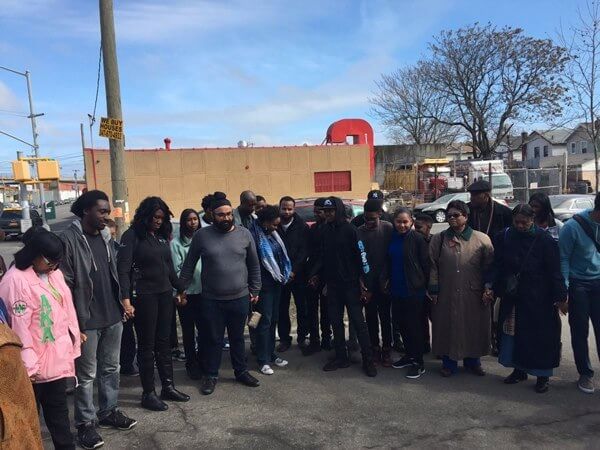By Gina Martinez
Jamaica leaders held a ”pray in” at a notorious dump site in southeast Queens.
Protesters gathered outside 173rd Street and Liberty Avenue Saturday in front of the waste transfer station owned by Royal Waste Services before taking a tour of the grounds. The dump site is directly across the street from a park and residential homes.
The demonstrators claimed it was unfair that they were subjected to terrible smells and unclean air. They said low-income communities of color bear the burden of housing dumps and that workers at Royal Waste, most of whom live in the community, are treated unfairly.
The privately held company handles residential and commercial trash and has a recycling operation.
Legislation has been introduced that would cap the amount of trash that can be processed in one community. The de Blasio administration is transitioning New York to a zone system for commercial waste. Royal Waste is no stranger to controversy. Sanitation workers throughout the years have accused the company of labor abuses and between 2006 and 2009 four workers died on the Jamaica Royal Waste site.
Mike Reali, vice president of Royal Waste Services,s aid the owners and staff at the dump are from the community and they bring high paying union jobs with benefits to Jamaica residents.
“Royal Waste is tremendously invested in the well-being and vitality of the community we call home,” he said. “We operate a facility according to all regulations set forth by city, state and federal regulators. We pride ourselves on continuously raising and improving our safety and environmental standards.”
A bus filled with parishioners from the Greater Allen A.M.E Cathedral of New York and community members arrived at the site along with Rev. Andrew Wilkes and Councilman Daneek Miller (D- St. Albans).
The protestors held hands in a prayer circle where Wilkes said a prayer for the community.
“Environmental racism pollutes God’s creation while burdening New York City’s communities of color with a disproportionate amount of trash,” he said. “The issue is an urgent matter of pastoral care. Congregates of Allen Cathedral often lament the danger of their children encountering fumes from the commercial waste tucks parked next to schools, homes and playgrounds.”
Eddie Bautista, executive director at New York City Environmental Justice Alliance, said lower income neighborhoods in the South Bronx, North Brooklyn and southeast Queens are being exposed to an overwhelming amount of fumes and it is up to them to unite and make sure the dump companies change.
“When it comes to commercial waste, we can’t have 200 companies converging on three or four communities,” he said. “We need to have these companies transform and create a new system, a system where they have to compete with each other not just for who makes the most money picking up the garbage, but which company treats the community and their workers the best. We don’t have to get the low hanging fruit anymore, those days are behind us. This is a city that talks a lot about equity, justice. We know now that the fight in DC is going to be a long one. None of us are afraid of long and hard fights, especially the African-American community that knows about long and hard fights.”
Miller and Wilkes led a tour of the grounds and the smell immediately overwhelmed the group. Residents were quick to remind everyone that in the summer that was the smell residents woke up to on a daily basis.
“This city and my colleagues talk a lot about justice and equity,” Miller said. “There is no reason why three, four communities in New York are responsible for 75 percent of the garbage. We just don’t want all the bad and negative things to be dropped in our community. Today we’re talking about environmental justice.



































